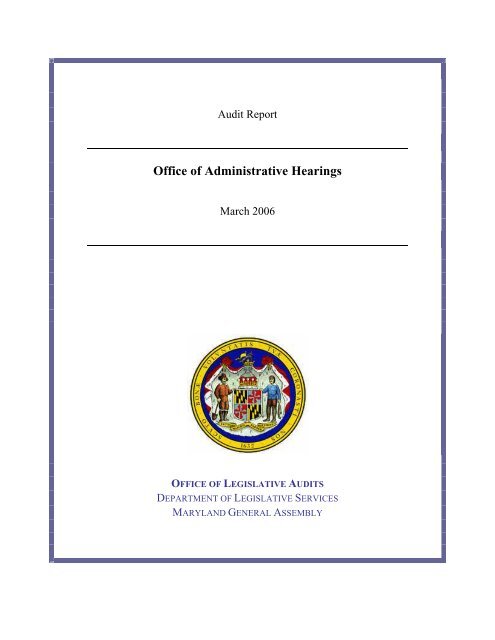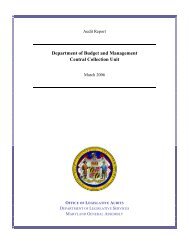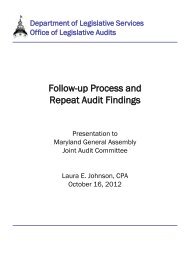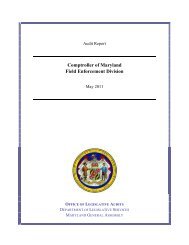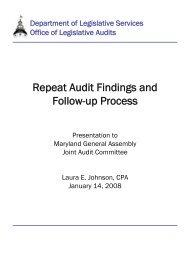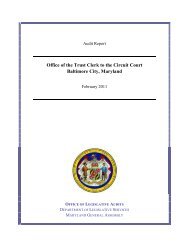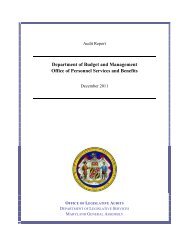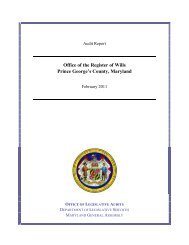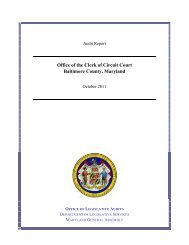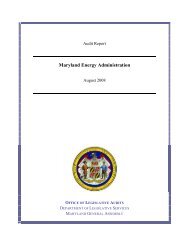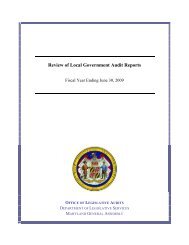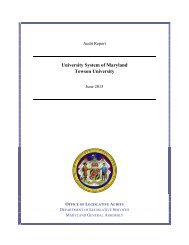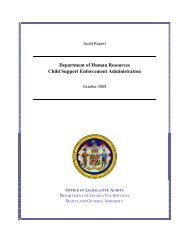Office of Administrative Hearings - Office of Legislative Audits
Office of Administrative Hearings - Office of Legislative Audits
Office of Administrative Hearings - Office of Legislative Audits
You also want an ePaper? Increase the reach of your titles
YUMPU automatically turns print PDFs into web optimized ePapers that Google loves.
Audit Report<br />
<strong>Office</strong> <strong>of</strong> <strong>Administrative</strong> <strong>Hearings</strong><br />
March 2006<br />
OFFICE OF LEGISLATIVE AUDITS<br />
DEPARTMENT OF LEGISLATIVE SERVICES<br />
MARYLAND GENERAL ASSEMBLY
• This report and any related follow-up correspondence are available to the public through the<br />
<strong>Office</strong> <strong>of</strong> <strong>Legislative</strong> <strong>Audits</strong> at 301West Preston Street, Room 1202, Baltimore, Maryland<br />
21201. The <strong>Office</strong> may be contacted by telephone at 410-946-5900, 301-970-5900, or 1-877-<br />
486-9964.<br />
• Electronic copies <strong>of</strong> our audit reports can be viewed or downloaded from our website at<br />
http://www.ola.state.md.us.<br />
• Alternative formats may be requested through the Maryland Relay Service at 1-800-735-<br />
2258.<br />
• The Department <strong>of</strong> <strong>Legislative</strong> Services – <strong>Office</strong> <strong>of</strong> the Executive Director, 90 State Circle,<br />
Annapolis, Maryland 21401 can also assist you in obtaining copies <strong>of</strong> our reports and related<br />
correspondence. The Department may be contacted by telephone at 410 946-5400 or 301<br />
970-5400.
March 24, 2006<br />
Senator Nathaniel J. McFadden, Co-Chair, Joint Audit Committee<br />
Delegate Charles E. Barkley, Co-Chair, Joint Audit Committee<br />
Members <strong>of</strong> Joint Audit Committee<br />
Annapolis, Maryland<br />
Ladies and Gentlemen:<br />
We have audited the <strong>Office</strong> <strong>of</strong> <strong>Administrative</strong> <strong>Hearings</strong> (OAH) for the period<br />
beginning May 13, 2002 and ending November 3, 2005.<br />
Our audit disclosed that OAH did not always collect the proper hearing fees<br />
provided for in State law, resulting in a loss <strong>of</strong> income to the State’s General Fund<br />
during fiscal year 2005 <strong>of</strong> approximately $215,000. In addition, proper internal<br />
controls were not established over the processing <strong>of</strong> certain purchasing and<br />
disbursement transactions and cash receipts. Finally, we noted that OAH did not<br />
ensure the reliability <strong>of</strong> certain information recorded in its case management<br />
system.<br />
Respectfully submitted,<br />
Bruce A. Myers, CPA<br />
<strong>Legislative</strong> Auditor
Table <strong>of</strong> Contents<br />
Background Information 4<br />
Agency Responsibilities 4<br />
Current Status <strong>of</strong> Findings From Preceding Audit Report 4<br />
Findings and Recommendations 5<br />
Cash Receipts<br />
Finding 1 – The <strong>Office</strong> Did Not Always Collect the Proper Hearing Fees 5<br />
Specified in State Law<br />
Finding 2 – Adequate Internal Control Had Not Been Established Over 5<br />
Certain Collections<br />
Purchases and Disbursements<br />
* Finding 3 – Proper Internal Controls Were Not Established Over 6<br />
Purchasing and Disbursement Transactions<br />
Caseload Management<br />
* Finding 4 – The <strong>Office</strong> Did Not Ensure the Accuracy <strong>of</strong> Caseload Data 7<br />
Recorded on Its Case Management System<br />
Audit Scope, Objectives, and Methodology 8<br />
Agency Response<br />
Appendix<br />
* Denotes item repeated in full or part from preceding audit report<br />
3
Background Information<br />
Agency Responsibilities<br />
The <strong>Office</strong> <strong>of</strong> <strong>Administrative</strong> <strong>Hearings</strong> (OAH) was established to provide an<br />
unbiased and objective forum for contested cases involving State agencies that<br />
regulate certain actions <strong>of</strong> businesses and citizens. According to OAH’s records,<br />
during fiscal year 2005, OAH disposed <strong>of</strong> 64,944 cases. The majority <strong>of</strong> cases<br />
heard by OAH relate to the Motor Vehicle Administration, the Department <strong>of</strong><br />
Health and Mental Hygiene, and the Department <strong>of</strong> Human Resources. OAH’s<br />
fiscal year 2006 appropriation provided for 122 employee positions, including 56<br />
administrative law judges. According to the State’s records, during fiscal year<br />
2005, OAH’s expenditures totaled approximately $11.3 million.<br />
Current Status <strong>of</strong> Findings From Preceding Audit Report<br />
Our audit included a review to determine the current status <strong>of</strong> the four findings<br />
included in our preceding audit report dated September 26, 2002. We determined<br />
that OAH satisfactorily addressed two <strong>of</strong> these findings. The remaining two<br />
findings are repeated in this report.<br />
4
Findings and Recommendations<br />
Cash Receipts<br />
Finding 1<br />
OAH did not always collect the proper hearing fees specified in State law,<br />
resulting in a loss <strong>of</strong> income to the State <strong>of</strong> approximately $215,000.<br />
Analysis<br />
OAH did not always collect the proper hearing fees provided for in State law.<br />
Specifically, effective July 1, 2004, State law increased the hearing fees from $15<br />
for all hearings to $125 for Motor Vehicle Administration hearings and $50 for all<br />
other hearings. However, our review disclosed that, as <strong>of</strong> November 2005, OAH<br />
had continued to collect the $15 hearing fee for certain hearings. For example,<br />
our test <strong>of</strong> 20 hearing fees collected during fiscal year 2005 disclosed that 11 <strong>of</strong><br />
the fees were for the incorrect amounts. According to OAH records, OAH<br />
collected the improper fee for 2,050 cases during fiscal year 2005, resulting in a<br />
loss <strong>of</strong> income to the State’s General Fund <strong>of</strong> approximately $215,000.<br />
We were advised by OAH management personnel that the improper fees were<br />
collected because, after July 1, 2004, the State agencies related to cases heard by<br />
OAH continued to distribute hearing request forms to the public specifying the<br />
$15 fee. However, OAH could not document that it took any action subsequent to<br />
July 1, 2004 to require State agencies to distribute the revised hearing request<br />
forms specifying the correct fees.<br />
Recommendation 1<br />
We recommend that OAH ensure that the proper hearing fees are collected,<br />
as required by State law.<br />
Finding 2<br />
Adequate internal controls were not established over certain collections.<br />
Analysis<br />
OAH lacked adequate segregation <strong>of</strong> duties over hearing and subpoena fee<br />
collections. Specifically, two employees responsible for either processing or<br />
depositing the collections also had the ability to process waivers for hearing and<br />
subpoena fees on the case management system, and such waivers were not<br />
reviewed or verified to supporting documentation by supervisory personnel.<br />
Consequently, these employees could misappropriate hearing and subpoena fees<br />
5
and the related hearing could still be scheduled without detection. During fiscal<br />
year 2005, OAH’s hearing and subpoena fee collections totaled approximately $2<br />
million.<br />
Recommendation 2<br />
We recommend that hearing and subpoena fee waivers processed on the<br />
system be reviewed and approved by an employee independent <strong>of</strong> the<br />
collection and deposit functions. We advised OAH on accomplishing the<br />
necessary separation <strong>of</strong> duties using existing personnel.<br />
Purchases and Disbursements<br />
Finding 3<br />
Proper internal controls were not established over the processing <strong>of</strong> certain<br />
purchasing and disbursement transactions.<br />
Analysis<br />
OAH did not fully use the security features available on the State’s Financial<br />
Management Information System (FMIS) to restrict user access and to prevent<br />
unauthorized purchase and disbursement transactions. Specifically, three<br />
employees could initiate and process certain purchasing or disbursement<br />
transactions without independent approval.<br />
As a result, these employees could process unauthorized transactions which may<br />
not be readily detected. Similar conditions were commented upon in our three<br />
preceding audit reports dating back to February 1997. According to the State’s<br />
accounting records, OAH used FMIS to process disbursements totaling<br />
approximately $2 million during fiscal year 2005.<br />
Recommendation 3<br />
We again recommend that OAH fully use the available FMIS security<br />
features by establishing independent on-line approval requirements for all<br />
critical purchasing and disbursement transactions.<br />
6
Caseload Management<br />
Finding 4<br />
OAH did not ensure that caseload data maintained on its case management<br />
system were accurate.<br />
Analysis<br />
OAH did not ensure that caseload data reflected in its automated case<br />
management system were reliable. As a result, management was not able to<br />
effectively monitor the status <strong>of</strong> cases. As <strong>of</strong> June 30, 2005, the case management<br />
system reflected a total <strong>of</strong> 5,652 open cases.<br />
Specifically, our test <strong>of</strong> 25 cases reported as open in OAH’s system as <strong>of</strong><br />
November 3, 2005 disclosed that 9 <strong>of</strong> these cases had been closed for periods<br />
ranging from 1 month to 22 months.<br />
The accuracy <strong>of</strong> caseload data was commented upon in our three preceding audit<br />
reports. Since caseload data are reported in OAH’s annual budget submission to<br />
the General Assembly and are used by OAH management to monitor caseload<br />
activity, it is important that such data be accurately maintained.<br />
Recommendation 4<br />
We again recommend that OAH ensure that caseload data maintained on the<br />
automated case management system are accurate.<br />
7
Audit Scope, Objectives, and Methodology<br />
We have audited the <strong>Office</strong> <strong>of</strong> <strong>Administrative</strong> <strong>Hearings</strong> (OAH) for the period<br />
beginning May 13, 2002 and ending November 3, 2005. The audit was conducted<br />
in accordance with generally accepted government auditing standards.<br />
As prescribed by the State Government Article, Section 2-1221 <strong>of</strong> the Annotated<br />
Code <strong>of</strong> Maryland, the objectives <strong>of</strong> this audit were to examine OAH’s financial<br />
transactions, records and internal control, and to evaluate its compliance with<br />
applicable State laws, rules, and regulations. We also determined the current<br />
status <strong>of</strong> the findings included in our preceding audit report.<br />
In planning and conducting our audit, we focused on the major financial-related<br />
areas <strong>of</strong> operations based on assessments <strong>of</strong> materiality and risk. Our audit<br />
procedures included inquiries <strong>of</strong> appropriate personnel, inspections <strong>of</strong> documents<br />
and records, and observations <strong>of</strong> OAH’s operations. We also tested transactions<br />
and performed other auditing procedures that we considered necessary to achieve<br />
our objectives. Data provided in this report for background or informational<br />
purposes were deemed reasonable, but were not independently verified.<br />
Our audit scope was limited with respect to OAH’s cash transactions because the<br />
<strong>Office</strong> <strong>of</strong> the State Treasurer was unable to reconcile the State’s main bank<br />
accounts during the audit period. Due to this condition, we were unable to<br />
determine, with reasonable assurance, that all OAH cash transactions were<br />
accounted for and properly recorded on the related State accounting records as<br />
well as the banks’ records.<br />
OAH’s management is responsible for establishing and maintaining effective<br />
internal control. Internal control is a process designed to provide reasonable<br />
assurance that objectives pertaining to the reliability <strong>of</strong> financial records,<br />
effectiveness and efficiency <strong>of</strong> operations including safeguarding <strong>of</strong> assets, and<br />
compliance with applicable laws, rules, and regulations are achieved.<br />
Because <strong>of</strong> inherent limitations in internal control, errors or fraud may<br />
nevertheless occur and not be detected. Also, projections <strong>of</strong> any evaluation <strong>of</strong><br />
internal control to future periods are subject to the risk that conditions may change<br />
or compliance with policies and procedures may deteriorate.<br />
Our reports are designed to assist the Maryland General Assembly in exercising<br />
its legislative oversight function and to provide constructive recommendations for<br />
improving State operations. As a result, our reports generally do not address<br />
activities we reviewed that are functioning properly.<br />
8
This report includes conditions that we consider to be significant deficiencies in<br />
the design or operation <strong>of</strong> internal control that could adversely affect OAH’s<br />
ability to maintain reliable financial records, operate effectively and efficiently,<br />
and/or comply with applicable laws, rules, and regulations. Our report also<br />
includes a finding regarding a significant instance <strong>of</strong> noncompliance with<br />
applicable laws, rules, or regulations.<br />
OAH’s response to our findings and recommendations is included as an appendix<br />
to this report. As prescribed in the State Government Article, Section 2-1224 <strong>of</strong><br />
the Annotated Code <strong>of</strong> Maryland, we will advise OAH regarding the results <strong>of</strong><br />
our review <strong>of</strong> its response.<br />
9
The Honorable Nathaniel J. McFadden, Chairman<br />
The Honorable Charles E. Barkley, Chairman<br />
March 21, 2006<br />
Page 2<br />
When structural changes are made to the form through legislation, MVA is the agency<br />
responsible for producing and distributing the new form. MVA advises all law enforcement<br />
agencies, by way <strong>of</strong> an <strong>of</strong>ficial letter, <strong>of</strong> the new form and directs that older copies discontinue<br />
being used. MVA receives a copy <strong>of</strong> every completed form, so they are aware that outdated<br />
forms are still being used.<br />
On April 29, 2004, I along with members <strong>of</strong> my staff, met with Mr. David Hugel, MVA<br />
Administrator, and members <strong>of</strong> his staff to discuss the fee increase that was to take effect on July<br />
1, 2004. A follow up letter dated April 30, 2004 to Mr. Hugel reiterated that OAH would not<br />
reject any hearing request which comes to OAH with an MVA form containing the old fee<br />
amount <strong>of</strong> $15.00.<br />
OAH is the repository for the fees, but is not the agency responsible to ensure that the<br />
correct fees are submitted by an appellant. Since MVA is the responsible agency for producing<br />
and distributing the form, it is they who must ensure that law enforcement agencies use the<br />
appropriate form.<br />
Finding 2:<br />
Adequate internal controls were not established over certain collections.<br />
Agency Response:<br />
Supervisory reviews had been established within the Finance Section in an effort to have<br />
a second individual approve all requests for hearing and subpoena fee waivers. The Auditors<br />
reviewed the procedures and noted that the approvals should be by an employee independent <strong>of</strong><br />
the collection and depositing function. Future waivers will be reviewed by the Director <strong>of</strong><br />
Administration as recommended by the Auditors.<br />
Finding 3:<br />
Proper internal controls were not established over the processing <strong>of</strong> certain purchasing and<br />
disbursement transactions.<br />
Agency Response:<br />
OAH periodically reviews the procedures regarding the processing <strong>of</strong> purchase and<br />
disbursement transactions. Due to the staffing size <strong>of</strong> Administration and the different types <strong>of</strong><br />
financial transactions that occur, it is not possible to completely separate some duties. To<br />
establish internal controls, all purchasing and disbursement transactions are reviewed and<br />
approved by a supervisor.<br />
As a result <strong>of</strong> this issue, OAH reviewed “approval verifications” in FMIS. OAH has
AUDIT TEAM<br />
Mark A. Ermer, CPA<br />
Audit Manager<br />
Channel D. Sumpter<br />
Senior Auditor<br />
Julie R. Newton<br />
Staff Auditor


